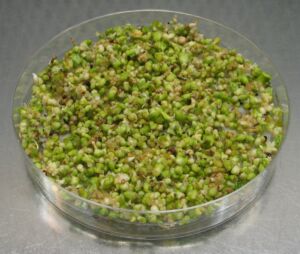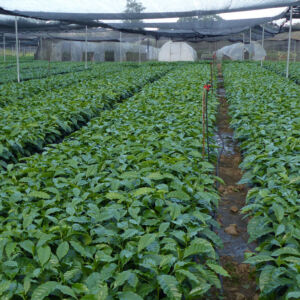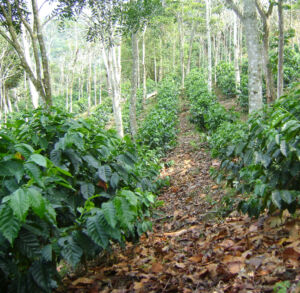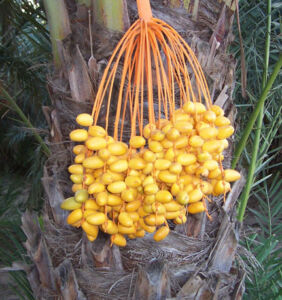biotechnologies and tropical plant breeding
Objectives
The Biotechnology and Improvement of Tropical Plants (BAPT) program offers advanced specialization in translational biology (transferring the knowledge acquired and approaches developed on model species to the improvement of non-model species of agronomic interest), as well as international project management for development aid. The choice of subjects for the M1 and M2 internships reinforces this specialization in a privileged context where demand in this field is exceptional both in France and internationally (national research institutes: CIRAD, IRD; international: CGIAR and international private companies). The aim of this combination of courses is to train students who are ready to embark on a doctoral thesis and become researchers who will be recruited into basic or applied research structures in the plant sciences. Alternative career paths exist for students who do not wish to follow this path (research engineers, scientific communication, consultancy for local authorities, associations, non-governmental organizations, etc.). For research, all research organizations are covered (Universities, CNRS, IRD, INRAe and CIRAD), including applied research facilities in partnership with companies in the plant improvement, plant biotechnology or development aid research sectors, as well as international research centers (CGIAR center, for example).
Training content
 The BAPT pathway is based on teaching units common to the BiPa, IPM and MEV pathways, designed to provide a foundation of fundamental knowledge in plant biology in the broadest sense, and the tools required for a scientific approach (statistics, bioinformatics, critical analysis, project management, etc.). This core curriculum includes an internship in M1 and M2, enabling students to contribute to the development of a research project in a laboratory of a public institute or private company. The subject and location of the internship are adapted to the student's course of study.
The BAPT pathway is based on teaching units common to the BiPa, IPM and MEV pathways, designed to provide a foundation of fundamental knowledge in plant biology in the broadest sense, and the tools required for a scientific approach (statistics, bioinformatics, critical analysis, project management, etc.). This core curriculum includes an internship in M1 and M2, enabling students to contribute to the development of a research project in a laboratory of a public institute or private company. The subject and location of the internship are adapted to the student's course of study.
Thanks to specific TU , including a specialized thematic school, and a choice of options offered in M1 and M2, the BAPT pathway is geared towards the appropriation of biotechnology tools, as well as knowledge of the practice of plant improvement, targeting in particular the main food and cash crops in Mediterranean and tropical environments.
A specific M1 TU , shared between the BAPT and Ibion-Tec courses, covers engineering approaches to the production of valuable plant molecules.
 In M2, two TU specific to the BAPT course enable students to work in small groups on a project based on a research question targeting the improvement of a cultivated plant in response to environmental changes (water deficit, poor soil, etc.). To do this, they are required to mobilize their knowledge in order to analyze phenotypes and adaptive plant strategies, model them and propose an improvement objective (ideoptype). The "Functional genomics of tropical and Mediterranean plants" thematic school aims to illustrate, through case studies, how knowledge acquired on model species and the use of genomics data on species still little studied can be used to design conventional or biotechnological improvement strategies for stress resistance in the main tropical species. This school, which enables exchanges between Master's students, doctoral students and researchers, also illustrates how partnerships can be set up and tools used to develop international and inter-institutional collaborative research targeting development aid. Through the choice of options offered, students can refine their training and either go further by working on plant adaptation to climate change or resistance to biotic stresses, or open up to the human and social dimensions of plant improvement.
In M2, two TU specific to the BAPT course enable students to work in small groups on a project based on a research question targeting the improvement of a cultivated plant in response to environmental changes (water deficit, poor soil, etc.). To do this, they are required to mobilize their knowledge in order to analyze phenotypes and adaptive plant strategies, model them and propose an improvement objective (ideoptype). The "Functional genomics of tropical and Mediterranean plants" thematic school aims to illustrate, through case studies, how knowledge acquired on model species and the use of genomics data on species still little studied can be used to design conventional or biotechnological improvement strategies for stress resistance in the main tropical species. This school, which enables exchanges between Master's students, doctoral students and researchers, also illustrates how partnerships can be set up and tools used to develop international and inter-institutional collaborative research targeting development aid. Through the choice of options offered, students can refine their training and either go further by working on plant adaptation to climate change or resistance to biotic stresses, or open up to the human and social dimensions of plant improvement.
 Last but not least, the Montpellier international campus is Europe's leading plant science research center dedicated to the improvement of Mediterranean and tropical cultivated species, thanks in particular to the establishment of theIRD (Institut de Recherche pour le Développement), and the CIRAD (Centre de Coopération Internationale en Recherche Agronomique pour le Développement), students will have access to a wide choice of internships in France or abroad, giving them the opportunity to explore the practicalities of carrying out research on a tropical crop species and/or projecting into a research field in the South in partnership with a national or international research institute.
Last but not least, the Montpellier international campus is Europe's leading plant science research center dedicated to the improvement of Mediterranean and tropical cultivated species, thanks in particular to the establishment of theIRD (Institut de Recherche pour le Développement), and the CIRAD (Centre de Coopération Internationale en Recherche Agronomique pour le Développement), students will have access to a wide choice of internships in France or abroad, giving them the opportunity to explore the practicalities of carrying out research on a tropical crop species and/or projecting into a research field in the South in partnership with a national or international research institute.
List of Teaching Units
M1, 1st semester
- TU common to all 4 Plant Biology courses:
- Biostatistics with R
- Plant molecular genetics
- Plant nutrition
- Plant development
- Plant-microorganism interactions
- Basics of ecophysiology
- TU spécifiques BAPT:
M1, 2nd semester
- TU common to all 4 Plant Biology courses:
- Experimental approaches to plant biology
- Bioinformatics: data and databases
- Literature review
- An optional TU to choose from:
- Gene networks-Modeling
- Tropical and Mediterranean plant breeding
- 4-month internship in a laboratory or company
M2, 1st semester
- TU common to all 4 "Plant Biology" courses:
- Quantitative genetics
- Epigenetics in plants
- Ecophysiology: from phenotype to ideoptype
- BigOmics, comparative genomics
- Data processing
- Bioinformatics: building queries
- Project management
- TU spécifiques BAPT:
- An integrated approach to plant breeding: a case study
- Integrated plant breeding project: phenotypes, models and ideotype
- Thematic School Genomics, Agroecology and Mediterranean and Tropical Plant Breeding
- An optional TU to choose from:
M2, 2nd semester
- Critical analysis of scientific information
- 6-month internship in a laboratory or company
